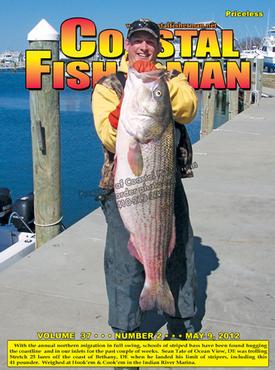


Article by Larry Jock
 ASMFC Atlantic Striped Bass Board Approves Draft Addendum III for Public Comment
ASMFC Atlantic Striped Bass Board Approves Draft Addendum III for Public Comment
The Commission’s Atlantic Striped Bass Management Board has approved for public comment Draft Addendum III to Amendment 6 to the Interstate Fishery Management Plan for Atlantic Striped Bass. The Draft Addendum proposes implementing a mandatory commercial tagging program for all states and jurisdictions with commercial striped bass fisheries and increasing penalties for illegally harvested fish. These options are intended to prevent commercial striped bass quota overages and the illegal harvest of striped bass. Both undermine the sustainability of striped bass populations, as well as reduce the economic opportunities of law abiding commercial fishermen. Options include increased accounting of unused tags, timely reporting of catch, the point at which tagging must occur, standardization of tag type, and development of biological metrics for determining state/jurisdiction tag quantity.
The Draft Addendum responds to recommendations of the Interstate Watershed Task Force (IWTF). The IWTF conducted a multi-year, multi-jurisdictional investigation on illegal commercial striped bass harvest within the Chesapeake Bay, resulting in over $1.6 million dollars in fines against 19 individuals and three corporations for more than one million pounds of striped bass harvested illegally. The investigation revealed some current control measures for regulating the harvest of striped bass were ineffective or inadequately designed to maximize compliance. The investigation also found that greater accountability of wholesalers would be difficult to achieve without uniform tags (colors, design) and tagging requirements, valid year and size limits inscribed on tags, and increased dealer compliance education.
Several states will be conducting public hearings on the Draft Addendum; information on those hearings will be released when they are finalized. Fishermen and other interested groups are encouraged to provide input on the Draft Addendum either by attending state public hearings or providing written comment. The Draft Addendum will be available on the Commission website (wwww.asmfc.org) under Breaking News or by contacting the Commission at 703.842.0740 by May 11, 2012. Public comment will be accepted until 5:00 PM (EST) on July 13, 2012 and should be forwarded to Kate Taylor, Fishery Management Plan Coordinator, at 1050 N. Highland St., Suite 200 A-N, Arlington, VA 22201; 703.842.0741 (FAX) or [email protected] (Subject line: Atlantic Striped Bass Draft Addendum III).
ASMFC American Eel Assessment Indicates Stock is Depleted
In its report to the Commission’s American Eel Management Board, an independent panel of scientists endorsed the findings of the 2012 benchmark stock assessment, which concluded the American eel population is depleted in U.S. waters. The stock is at or near historically low levels due to a combination of historical overfishing, habitat loss, food web alterations, predation, turbine mortality, environmental changes, toxins and contaminants, and disease. The panel urged the Board to examine alternative reference points to provide more protection to the spawning stock biomass.
Both trend and model analyses results indicate the American eel stock has declined in recent decades and the prevalence of significant downward trends in multiple surveys across the coast is cause for concern. Based on these findings, the stock is considered depleted. No overfishing determination can be made at this time. However, the Commission’s American Eel Technical Committee and Stock Assessment Subcommittee caution that although commercial fishery landings and effort in recent times have declined in most regions (with the possible exception of the glass eel fishery), current levels of fishing effort may still be too high given the additional stressors affecting the stock such as habitat loss, passage mortality, and disease. Fishing on all life stages of eels, particularly young-of-the-year and in-river silver eels migrating to the spawning grounds, could be particularly detrimental to the stock, especially if other sources of mortality (e.g., turbine mortality, changing oceanographic conditions) cannot be readily controlled. Management efforts to reduce mortality on American eels in the U.S. are warranted.
In response to the findings, the Board tasked the American Eel Technical Committee with developing potential management actions for Board consideration at its next meeting. A more detailed overview of the American eel stock assessment is available on the Commission website at http://www.asmfc.org/speciesDocuments/eel/AmericanEelStockAssessmentOverview_May2012.pdf. It was developed with the intent of aiding media and interested stakeholders in better understanding the Commission’s stock assessment results and process. The American Eel Stock Assessment Report and Assessment Peer Review Report will be posted to the Commission website under Breaking News on May 7. For more information, please contact Kate Taylor, Fishery Management Coordinator, at [email protected] or 703.842.0740.
NMFS Proposes to Adjust 2012 Swordfish Quotas
Based on the International Commission for the Conservation of Atlantic Tunas (ICCAT) Recommendation 11-02 for North Atlantic swordfish and Recommendation 09-03 for South Atlantic swordfish, NMFS proposes to:
For North Atlantic Quotas:
• Maintain the existing US baseline quota at 2,937 metric tons (mt) dressed weight (dw)
• Transfer 112.8 mt dw to Morocco
• Change the underharvest carryover from 50 percent of the baseline quota to 25 percent of the baseline quota (734.3 mt dw)
• For 2012, adjust the baseline quota to 3,672 mt dw.
For South Atlantic Quotas:
• Maintain the existing U.S. baseline quota at 75.2 mt dw, carryover allowances, quota transfers, and other regulations
• For 2012, adjust the baseline quota to 75.2 mt dw.
For Commercial and Recreational Minimum Sizes:
• Implement a 25 inch cleithrum to keel (CK) measurement per ICCAT Recommendation 11-02
• Allow the existing 47- inch lower jaw fork length (LJFL) measurement to apply to swordfish without a bill
• Consider a range of other minimum sizes.